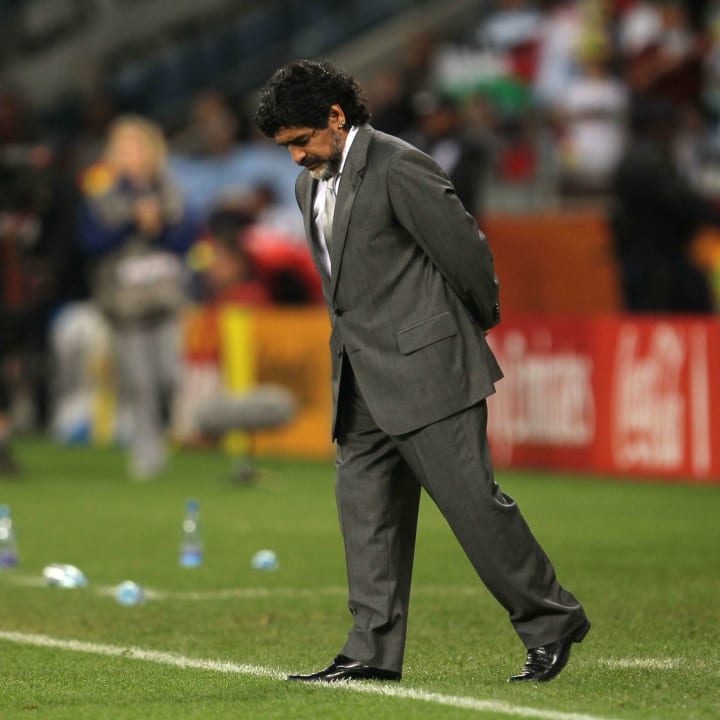
Diego Maradona the manager: Looking back at an unforgettable coaching career
As a player, Diego Maradona’s legacy is almost untouchable. He was a serial winner at both club and international level, and he racked up the individual accolades as well. He boasted the kind of trophy cabinet most players can only dream of.
He saw the game in a completely different way to anyone around him and knew exactly what it took to win in style. On paper, a transition to a managerial role after his retirement made all the sense in the world.
While Maradona never found a way to translate his success as a player into managerial glory, his 12-year spell in various dugouts will live long in the memory for all sorts of different reasons.
Diego Armando Maradona ?
Remembering 10 ?????????? moments from the ?????? number 10, a year on from his death… pic.twitter.com/9ujF2o7zbx
— 90min (@90min_Football) November 25, 2021
Maradona’s career as a manager actually began during his playing days. After a failed drug test led to a 15-month suspension from playing in 1994, Maradona had to look elsewhere to quench his insatiable urge to play football, and so he turned to management.
Alongside close friend Carlos Fren, Maradona sat down for negotiations with Argentinian side Deportivo Mandiyu, who brought the pair in in late 1994. However, because Maradona had no qualifications whatsoever, he had to spend his first three games in the stands as he was not allowed in the dugout.
Truth be told, it’s not a spell which is remembered overly fondly. Mandiyu were in real decline and had countless behind-the-scenes issues. All the turmoil saw Maradona leave the club after just 12 games. He only managed one win during his time at the club, a 3-0 win over Gimnasia y Esgrima de Jujuy, but his side’s 2-2 draw with giants River Plate is still spoken about to this day by fans of the club.
Maradona and Fren found a similar gig with Racing Club in early 1995, but their time at the club was similarly short-lived, lasting just four months, and is perhaps best remembered for Maradona sticking his middle finger up at the crowd on his debut and squirting water at a linesman and being sent to the stands during a 0-0 draw with Independiente.
Un 5 de marzo pero de 1995, Diego Maradona dirigió a #Racing por primera vez en el Cilindro y consiguió una victoria 1-0 ante #Platense. pic.twitter.com/9vSy8pq34x
— Racingmaníacos (@RacingManiacos) March 5, 2020
After leaving Racing, Maradona switched his attention back to playing. He did dream of becoming Boca Junior’s player/manager, but the club’s refusal to part ways with current boss Silvio Marzolini saw Maradona eventually accept a role as a player.
He called time on his playing career in 1997 and spent eight years out of the game before becoming a board member at Boca in June 2005. One of his first decisions was to hire Alfio Basile as manager, and it’s a decision which paid off immediately after Basile led Boca to five trophies before his departure in 2006.
Citing frustration towards Basile’s decision to join the Argentinian national team, Maradona walked away from Boca in August 2006, and he ended up being the man to replace Basile at the helm of La Albiceleste in 2008.
He made his debut as manager on November 19, 2008 against Scotland at Hampden Park which, fittingly, was where Maradona netted his first goal for the national team all those years earlier. A 1-0 win was the perfect way to celebrate the day.

Unfortunately, just five months later, things took a bad turn. Argentina were thumped 6-1 by Bolivia, and defeats to Brazil and Paraguay weren’t far behind. Many were questioning whether Maradona’s playing career was the only reason he’d been given the job.
Nevertheless, he continued. Maradona called up a whopping 70 different players during qualification for the 2010 World Cup, and his ecstasy towards reaching the tournament was clear during a victory over Peru, when Martin Palermo’s 94th-minute winner was celebrated by Maradona belly-sliding across the rain-sodden turf of El Monumental.
In response to critics, he famously told the journalists that they could stick their comments ‚up their a**e‘, before grabbing his crotch in the direction of one of the cameras.

„They can suck it and carry on sucking it,“ he said (via Goal). „This is for all Argentines, minus the journalists.
„I want to thank my players for qualifying because they played like men and today they consecrated me as a coach. I also want to dedicate this to the whole of Argentina, to my family too, but there is one group who do not deserve this because they have treated me like rubbish.
„I don’t usually read the newspapers or listen to sports programmes but my daughters do and they told me what had been said about me. So, I repeat, to all those that said anything against me, keep eating your words.“
Unsurprisingly, that rant earned Maradona a two-month ban from FIFA, but he returned in time for the 2010 World Cup. He watched on as Argentina fell to Germany in the round-of-16, after which he walked away from the team after seeing a lot of his coaching staff removed from their positions.

His two years with Argentina was the longest period Maradona actually spent in any dugout. He spent time with UAE sides Al-Wasl and Fujairah, before heading to Mexico with Dorados de Sinaloa.
It was perhaps his most successful time as a manager. Maradona led Dorados to 18 wins, ten draws and seven losses, but after failing to clinch promotion to the Mexican top flight, Maradona stepped down to focus on getting knee surgery for the osteoarthritis which had left him unable to walk.
After a few months of rest, Maradona was back in Argentina with Gimnasia de La Plata, with whom he would remain until his tragic death.
#TNTSports | La inconfundible firma de Maradona en el sillón que le dio Newell’s.#Newells ? #Gimnasia pic.twitter.com/qMUgUJeWOZ
— TNT Sports LA (en ?) (@TNTSportsLA) October 29, 2019
Excitement around Maradona’s move to the club forced Gimnasia to hire a new team of secretaries to deal with the ludicrous demand from supporters to become members of the club. They picked up 3,000 new members in just four days, when they were used to dealing with just 200 applications per day.
It might not have been the most successful spell of Maradona’s career, but it brought one of the best moments. When he took Gimnasia back to Newell’s Old Boys (his first club), he was given a pitch-side throne upon which to watch the game.
Nos elegimos para siempre.#DiegoEterno pic.twitter.com/5UT6VaMqUh
— #Gimnasia133 ?? (@gimnasiaoficial) November 26, 2020
Maradona was rewarded with a new contract in June 2020, but was soon forced to take time away from the club to focus on his health, and he tragically lost his life on November 25.
A Gimnasia statement summed up his passing well: „With tears in our eyes, and with denial as a defence mechanism in the face of this type of situation, we bid farewell to the God of football with deep pain.“